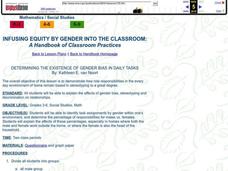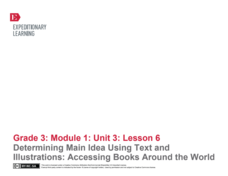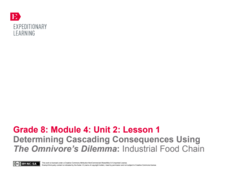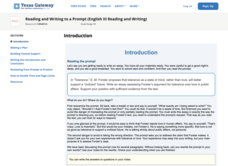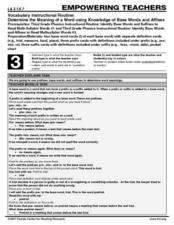Curated OER
Lesson 1: English-Indian Encounters
What did the English settlers think of the Native Americans inhabiting the Chesapeake region of the United States? Learners analyze a series of documents and images to determine the English perception of the local inhabitants. A great...
Curated OER
Determining Author's Point of View: The Sneeches
Determine the author's point of view in a text. Young readers read Dr. Seuss' The Sneeches and identify the author's purpose in the story. They identify persuasive techniques in writing, asking and answering questions to better...
Curated OER
Determining the Existence of Gender Bias in Daily Tasks
Help your kids explore gender bias. Learners design and conduct a survey examining role responsibilities within families. They determine the percentage of responsibilities for males vs. females and graph the results. Then they analyze...
Texas Education Agency (TEA)
Cognates (English III Reading)
Did you know that "30-40 percent of all words in English have a related word in Spanish?" This fact launches an interactive study of cognates appearing the same in English and Spanish. Learners demonstrate what they have learned about...
Curated OER
Using a Title to Determine the Main Idea
Use the title of a book to determine the main idea. Readers will view the cover of The Wedding and predict what the story will be about. Graphic organizers help chart important information and build new vocabulary. Other stories are used...
EngageNY
Determining Main Idea Using Text and Illustrations: Accessing Books Around the World
Ease into informational text with the lesson suggested here. Part of a unit series, the lesson draws from previous lessons and acts as a natural moment to add in informational text. Class members read one section of My Librarian is a...
PBS
Blue Ribbon Readers: Determining Important Ideas
Brenda Z. Guiberson’s nonfiction book, Cactus Hotel, launches a series of activities that model for readers how to determine the main idea in a passage. Class members engage in an online interactive game to test their understanding. The...
EngageNY
Reading for Gist, Answering Text-Dependent Questions, and Determining Author’s Purpose: Industrial Organic Food Chain
After re-reading The Omnivore’s Dilemma using a Reading Closely: Guiding Questions handout, class members use sticky notes to annotate and determine the gist of the text. Finally, they use an Author’s Purpose graphic organizer to...
EngageNY
Determining Cascading Consequences Using The Omnivore’s Dilemma: Industrial Organic Food Chain
Organic versus conventional farming: which option is best? Pupils use Michael Pollan's The Omnivore's Dilemma to determine the cascading consequences of the industrial organic food chain. They work in research teams to create an...
Curated OER
Spanish-English Cognates in the ELL Classroom: Friends or Foes?
Define the meaning of a cognate and use the concept to help Spanish-speaking ELLs connect their first language to English. Middle schoolers explore Latin roots to find cognates in both languages. They relate the Spanish and English word...
Schools United to Provide Enhanced Resources Network
AP English Project: Journal of Literary Terms and Devices
To prepare for the AP English exams, individuals are asked to create a notebook of literary terms and devices. The terms must be defined, accompanied by representative artwork, and illustrated by an example drawn for a named source. A...
TV411
How Many Languages Do You Speak When You Speak English?
What do the words pizza, broccoli, and ciao have in common? Why they are all English words that originally came from Italian. Ask your middle schoolers to guess the origins of a list of words by matching the word with the language from...
College Board
2009 AP® English Literature and Composition Free-Response Questions Form B
Do you have a political agenda? Some authors do. Scholars analyze a piece of work and determine how the author deals with a political or social issue. Responding to two other essay questions, writers create essays exploring how authors...
College Board
2009 AP® English Literature and Composition Free-Response Questions
Scholars select a novel or play and craft an essay to discuss what the symbol reveals about the characters or theme. Writers also analyze a passage and a poem to determine how the authors use literary elements to relay their messages.
College Board
2002 AP® English Language and Composition Free-Response Questions Form B
"Don't go forth today." Why would Caesar's wife not persuade him to stay home? Scholars read an excerpt from the play Julius Caesar and write essays on why Caesar listened to Decius rather than his wife. Pupils then write two more essays...
Curated OER
Express Yourself Lesson Seed 2
Use Langston Hughes's poem, "Words Like Freedom," to explore the concepts of freedom and liberty. Learners read the poem, determine the theme, and use the provided graphic organizer to examine the connotative and denotative meanings of...
EngageNY
Getting the Gist and Determining Word Meaning: Paragraphs 20–23 of Steve Jobs’ Commencement Address (and connecting to Chapter 10)
Groups create a list of the character traits of Steve Jobs and Buddy, the main character of Christopher Paul Curtis' Bud, Not Buddy, and share and select evidence from Jobs' 2005 Stanford University Commencement Address to support their...
EngageNY
End of Unit Assessment: Finding Evidence of Laurence Yep’s Perspective on Being Chinese in Dragonwings and Determining Connotative Language
There's a fine line between reality and fiction. As an end-of-unit assessment, scholars complete worksheets to analyze how Laurence Yep's perspective on being Chinese factors into his novel Dragonwings. Next, pupils engage in a class...
EngageNY
Determining Cascading Consequences Using The Omnivore’s Dilemma: Industrial Food Chain
Which of Michael Pollan's four food chains from his book The Omnivore's Dilemma would best feed everyone in the United States? Using a thought-provoking resource, scholars learn how to create a Cascading Consequences chart to answer the...
Texas Education Agency (TEA)
Reading and Writing to a Prompt (English III Reading and Writing)
Learning to read and write in response to a prompt is an essential skill. Users of this interactive learn how to analyze a writing prompt to determine the many facets that must be addressed, how to plan and structure a response, and how...
K12 Reader
Determine the Meaning
Enhance elementary readers' vocabulary skills with a worksheet focused on context clues. Individuals read ten short sentences, each with an underlined word, and look over four options to find the most appropriate synonym that could...
EngageNY
Getting the Gist and Determining Word Meaning: Paragraphs 12–14 of Steve Jobs’ Commencement Address (and connecting to Chapter 8)
Groups use a Venn diagram to compare the theme of love and loss in Steve Jobs' 2005 commencement address to Stanford University students and Christopher Paul Curtis' Bud, Not Buddy.
Curated OER
Test Your Grammar skills Using Determiners 2
In this grammar activity, students proofread 15 sentences, correcting any errors with nouns and determiners. Example: "this tall buildings" has an error and should be "this tall building." There is no information on the page and no...
Curated OER
Determine the Meaning of a Word Using Knowledge of Base Words and Affixes
Affixes can change the entire meaning of a word! Pupils practice with three prefixes and three suffixes in this scaffolded word meaning resource. There are affix cards here you can display in a pocket chart as you review. Learners first...




